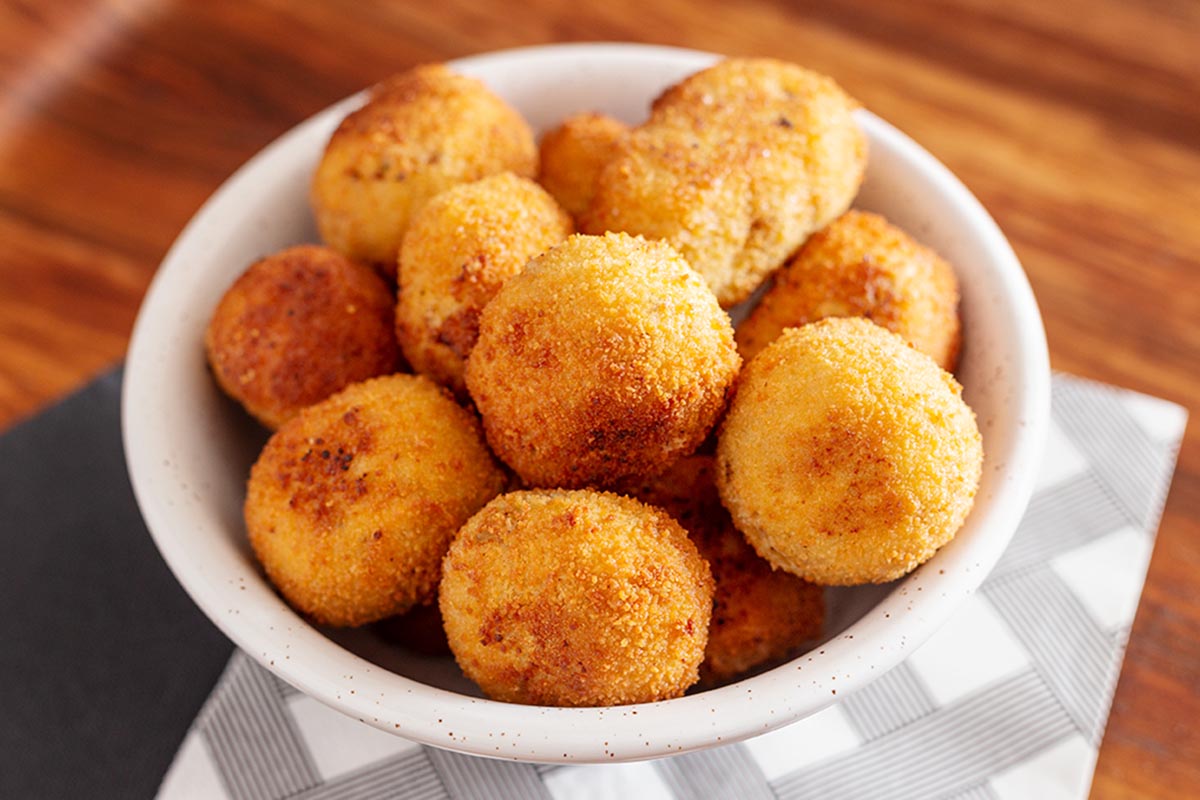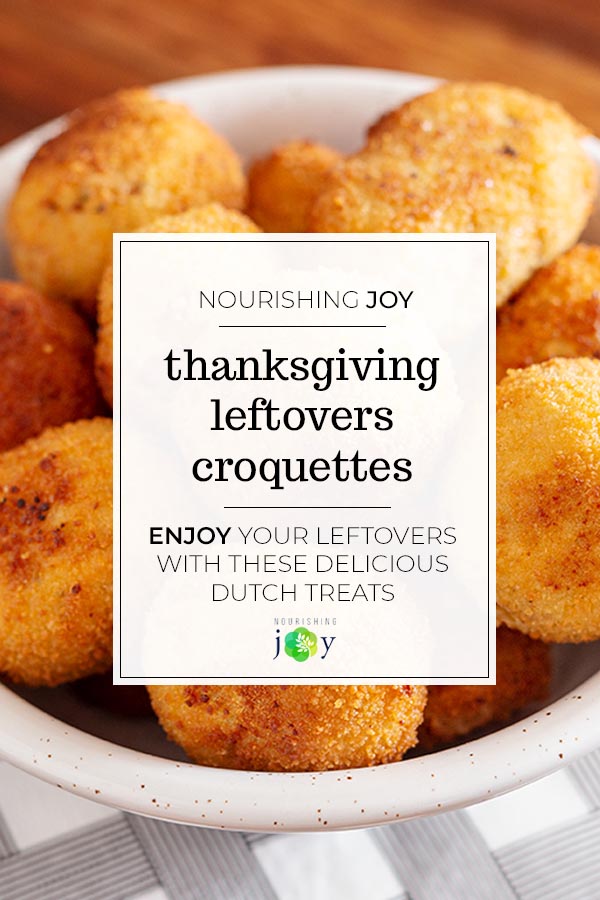Thanksgiving Leftovers Kroketten (Dutch Croquettes)
This post may contain affiliate links, including those from Amazon.com, which means we earn a small commission off your purchases. And here's the thing: We only mention services and products that we think are truly worth your attention, whether they're free, paid, or otherwise. This site relies on YOUR trust, so if we don't stand behind a product 110%, it's not mentioned. Period.
When I married into a Dutch family, I was suddenly immersed in a few wonderful new holiday food traditions.
My favorites, bar none, have been the deep-fried foods made at Christmas and New Years. Each year, my husband rolls up his sleeves and makes batches and batches of appelflappen and oliebollen (two Dutch-style doughnuts). And gatherings with cousins and friends wouldn't be complete without kroketten (or “croquettes” – as they're called just as often – or bitterballen, when they're made as balls instead of rolls), a Dutch version of a breaded sausage roll.
See my sourdough oliebollen recipe here.
So one year, when I was looking forward to croquettes a bit earlier than usual and I had extra Thanksgiving leftovers filling the fridge, I decided to do a bit of experimentation with the kroketten recipe and discovered that not only do croquettes work with Thanksgiving leftovers, they actually work really, really well.
Later, when I ran across a reference in my mother-in-law's old copy of the cookbook that was used after World War II in the Amsterdam Home Economics School (with her help translating from the Dutch), I learned that it actually made sense, as kroketten first became a Dutch “thing” in the 1940's as a way to use up Sunday dinner leftovers!
Considering the food shortages that happened in the early part of that decade in the Netherlands, I have no doubt that the Dutch are some of the most creative cooks to make leftovers enticing. Basically, making croquettes to use up Thanksgiving leftovers is pretty much exactly what croquettes are intended to do. 🙂
With that, happy (leftover) feasting!
Use Our Unique Thanksgiving Guide
Get All the Thanksgiving Recipes You Need
Whether you're looking for planning tools, breakfast and leftover recipes, or last-minute feasting inspiration, our Thanksgiving guide will help you enjoy your entire Thanksgiving Day.
Thanksgiving Leftovers Kroketten (Dutch Croquettes)
Ingredients
For the filling:
- 1 ½ cups leftover gravy, (If you don't have leftover gravy, see the Notes section below)
- 1 ¼ cups leftover cooked meat (turkey, chicken, pork, ham)
- ¾ cup leftover stuffing OR more leftover meat
- ¼ cup leftover vegetables OR leftover mashed potatoes OR more leftover meat
- ½ medium onion
- 1 tablespoon Ketjap Manis (sweet Indonesian soy sauce) OR 2 teaspoons brown sugar + 1 teaspoon soy sauce
- 1 tablespoon dried thyme
- 1 tablespoon dried parsley
- salt and pepper, to taste
For the breading:
- 1 cup all-purpose flour
- 2 eggs
- ¼ cup milk or cool water
- 2 cup fine breadcrumbs
- ½ teaspoon sea salt
- ½ teaspoon black pepper
For frying:
- enough vegetable oil, palm shortening, lard, or your favorite frying fat to fill a stock pot 2-3" deep
Instructions
- Prepare the gravy. Place the leftover gravy in a large bowl. If you're making a quick gravy, pour it in the bowl when it's finished cooking. (See the Notes for a quick gravy recipe.)
- Grind the leftovers. Place the leftover meat, stuffing, and vegetables in the bowl of a food processor along with the onion, Ketjap Manis, and seasonings. Pulse to dice everything well, then process until smooth.
- Create the filling paste. Dump the meat mixture into the large bowl with the gravy and stir together to create a cohesive paste. The paste should hold together easily but not be super sticky. If it's too dry, add more gravy. If it's too sticky, you may add a small amount of flour OR grind more meat or stuffing to mix in.
- Form the croquettes. Cover a baking sheet with parchment paper, then shape the paste into little logs and lay them on the baking sheet. Aim for logs that are about 3" long and 1" in diameter – they'll look like fat little breakfast sausages. Alternatively, you can roll them into balls about 1 ½-inch diameter, which are called bitterballen rather than kroketten.
- Prepare your breading station. Create a breading station using three bread pans or other rectangular containers. In the first pan, add the flour. In the second pan, lightly whisk the eggs and milk together. In the third pan, mix together the breadcrumbs, salt, and pepper.
- Bread the croquettes. Roll each croquette log in the flour, then submerge it in the egg-milk mixture, then roll in the breadcrumbs, tapping off the excess after each step. Return each breaded croquette to the baking pan. You'll be cooking them in batches of 5-8 croquettes at a time, depending on the size of your pan.
- Preheat the oven and heat the oil. Pour the oil into a heavy-bottomed pot with tall sides, such as a stock pot, until the oil comes up the sides by 2-3 inches. Clip a candy thermometer to the side if you have one. Turn the heat to medium-high. Preheat oven to 200°F and place a baking sheet lined with parchment paper on the middle rack.
- Cook the croquettes. When the oil has reached 360°-370°F, add the first batch of croquettes. (See how to test the oil temperature if you don't have a candy thermometer in the Notes section below.) We cook in batches so that the oil temperature doesn't plummet too much when the croquettes are added, which would result in greasy, soggy croquettes. Cook until the outsides are deep golden-brown, about 6-9 minutes, turning them over about halfway through cooking. Place finished croquettes in the oven to stay warm. After each batch, return the oil to 360°-370°F again before adding the next batch.
- Serve the croquettes. The croquettes can be eaten plain or dipped in mustard. The only question is whether you want classic yellow mustard, Dijon-style, or seedy brown. The choice is up to you!
Notes
Don't have leftover gravy? No problem!
Make this quick gravy:- 4 tablespoons butter
- 6 tablespoons all-purpose flour
- 1 1/2 cups milk or chicken stock






